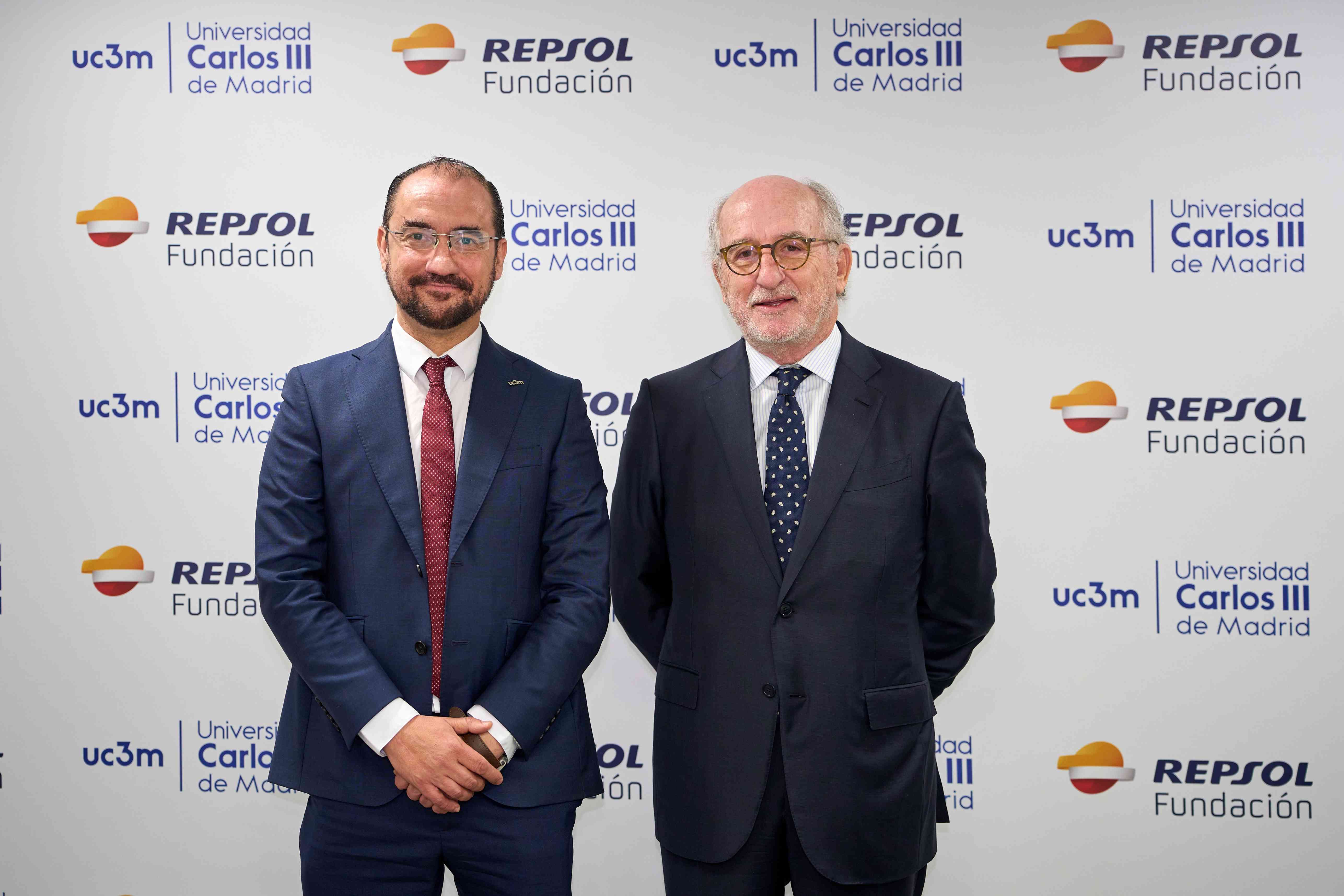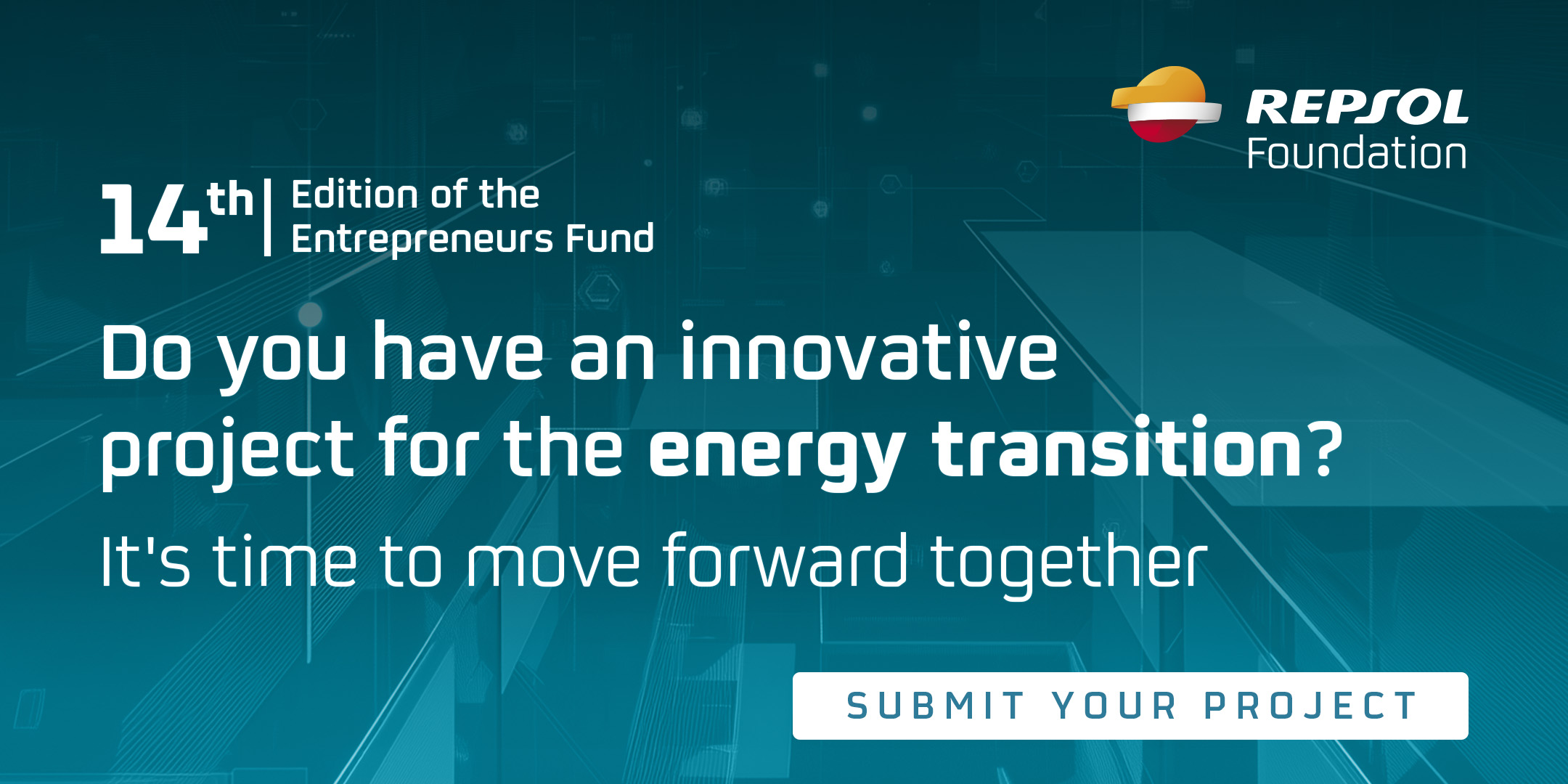
Antonio Brufau: “The energy transition and decarbonization process will be crucial in maintaining industry, employment, and wealth in Spain”

- The Minister of Industry and Tourism, Jordi Hereu; Repsol chairman, Antonio Brufau, and CEO of CaixaBank, Gonzalo Gortázar, were in charge of opening the conference on “Industrial transformation towards net Zero”.
- The event was held today on the Repsol Campus, within the framework of Open Room's third anniversary, the Repsol Foundation's space for debate and knowledge on energy transition.
- “The industry needs a fair competitive environment, where products manufactured under environmental regulations are not at a disadvantage compared to those imported from countries with less rigorous requirements,” said the Minister of Industry and Tourism, Jordi Hereu, who recalled that we must increase investment in innovation and technology, reduce energy costs, and work for a more united and effective European internal market.
- Antonio Brufau highlighted the importance of “Europe reorienting its industrial strategy so companies like Repsol can compete on equal terms in the decarbonization process.”
- “We're at a key moment where we need to decide what we want to be in Europe: a world leader, like 10 years ago or simply a playground for the US and China,” added the Repsol chairman.
- Brufau pointed out that “we must be optimistic that our new European rulers will apply or, at the very least, take into account what the Draghi and Letta reports say”
- Gonzalo Gortázar stressed that "the financial sector plays a key role as a channel for the investment and financing required by the industry's decarbonization process."
- The event also included a speech from former Italian Prime Minister, Enrico Letta, who mentioned that “the only way to ensure Europe's competitiveness, and not fall behind actors like China or the US, is to talk to our companies to understand their problems and how we can help.Listening to the industry is key, as is innovation.”
- In his closing speech, Repsol CEO, Josu Jon Imaz, stressed that technology is key in addressing the energy transition and achieving a more competitive industry.
Today, the Repsol Foundation held the conference “Industrial transformation towards Net Zero” on the Repsol Campus, within the framework of Open Room's third anniversary, its digital space for debate and knowledge on the energy transition.
Experts and leaders from the business, academic, and institutional world met to analyze the different variables involved in the industrial transformation process, such as the European and industrial context, resources, processes, new products or the role people play.
The event began with a high-level dialog on “Competitiveness and industry” between Jordi Hereu, Minister of Industry and Tourism; Antonio Brufau, Repsol chairman, and Gonzalo Gortázar, CEO of CaixaBank.
In his speech, Jordi Hereu highlighted the main challenges the Spanish industry faces in order to remain competitive with the rest of the European industry.
“The industry needs a fair competitive environment, where products manufactured under environmental regulations are not at a disadvantage compared to those imported from countries with less rigorous requirements,” said the Minister of Industry and Tourism, Jordi Hereu, who recalled that we must increase investment in innovation and technology, reduce energy costs, and work for a more united and effective European internal market.
The EU is undertaking a profound transformation with the aim of achieving carbon neutrality by 2050 while ensuring its industry's competitiveness.
In this sense, the Repsol chairman highlighted the importance of having a powerful industry not only for Spain but also for Europe. That's why he pointed out that Europe has to lead the energy transition.
“We must commit to real technological neutrality by adopting a comprehensive approach that includes fiscal, innovation, and governance policies,” said Antonio Brufau.
He also added that “it is necessary to have all the current solutions, and those that will be developed in the future, to achieve emissions reduction objectives more quickly and enhance our competitiveness as an industry”
“If regulation continues to focus exclusively on sustainability, we will reduce emissions here, but we'll move them abroad, we'll continue to harm the planet and, what's worse, we'll do so while destroying our economy, the competitiveness of our companies and jobs in the industrial sector.”
The Repsol chairman referred to the Draghi and Letta reports that point out “that we have to change because if we don't, Europe won't have any say on the planet.”
Gonzalo Gortázar stressed that “the financial sector plays a key role as a channel for the investment and financing required by the industry's decarbonization process with the aim of supporting customers, especially the industrial sector, in their decarbonization plans.” “It's not only, nor even mainly, about financing clean energy, but about working with our customers to finance a necessary transition that, in many cases, will take a long time,” stated the CEO of CaixaBank.
The president of the Jacques Delors Institute also spoke at the event, along with the former Prime Minister of Italy, Enrico Letta, who in April this year presented an independent report to the European Commission on the future of the single market. The report tries to trigger debate and raise awareness about the need to advance the integration of the EU's single market in three key areas: energy, telecommunications, and financial services.
Letta referred to the main findings of his report that can have a greater impact on promoting the competitiveness of European energy companies, such as Repsol. For the former Italian Prime Minister, the main conclusion he draws, after nine months of reflecting on Europe, is that “the only way to ensure Europe's competitiveness, and not fall behind actors like China or the US, is to talk to our companies to understand their problems and how we can help. Listening to the industry is key, as is innovation,” stressed Enrico Letta.
During the day, the executive managing director of Energy Transition, Technology, Institutional Affairs & Deputy CEO of Repsol, Luis Cabra, spoke, explaining the framework and context of Repsol's industrial transformation process, pointing out the challenges and opportunities the company has on its path towards carbon neutrality.
Luis Cabra pointed out that "something is missing in the Draghi report and in the European regulation, in terms of the opportunity to improve conditions so combustion vehicles, together with carbon-neutral renewable fuels, can facilitate the long-term future of an automotive industry currently in crisis and the refineries that produce fuel, industries where the EU and Spain in particular are leaders.”
During the event, a round table was held called “The transformation of raw materials and industrial processes”. Repsol's executive managing director of Industrial Transformation and Circular Economy, Juan Abascal, and the directors of the Repsol Foundation's energy transition research and education programs: José Ignacio Linares, Ion Agirre, Fèlix Llovell, and Tomás Gómez-Acebo, from the Comillas- ICAI, País Vasco, Rovira i Virgili, and Navarra universities, respectively; shared their take on Repsol's transformation within the framework of the energy transition. The table discussed aspects such as CO2 management in industrial complexes, energy efficiency, the use of hydrogen and renewable electricity, natural gas, and the capture and use of CO2.
The evolution of Repsol's industrial centers was also analyzed at the table on “The transformation of products”. Repsol's LPG director, Siridia Berenguer; director of the sustainable mobility education and research program at Madrid's Universidad Politécnica, Ricardo Perera, and the professors, Luis Veiga, from the Universidad Nova School of Business & Economics, and Andrés Inca, from Madrid's Universidad Carlos III.
The speakers talked about promoting the production of renewable fuels, advanced biofuels, and carbon-neutral synthetic fuels. They concluded that these developments will be key in the decarbonization of mobility, industry, and cities in Spain and Europe.
The last round table held discussed the role people play in the transformation process and how industrial companies are adapting their training and development programs to prepare their teams with the new skills this change demands. Carmen Muñoz, Repsol's executive managing director of People and Organization, along with Marta Isarria, managing partner of Human Capital at Deloitte; Amaya Mendikoetxea, rector of Madrid's Universidad Autónoma, and Natalia Paula Matteis, global director of Talent at Minsait, all took part at the table.
The speakers discussed the collaboration between the university and the company to promote the development of talent. In addition, the opportunities offered by digitalization, the new professional profiles that are emerging, and the necessary capabilities to face the challenges of a constantly evolving environment.
Repsol CEO, Josu Jon Imaz, closed the session by stressing that technology is key in addressing the energy transition and achieving a more competitive industry.
Open Room, leading community in energy transition
This conference is part of Open Room, the Repsol Foundation space focused on encouraging debate and sharing tested and proven knowledge around the keys to the energy transition, which is celebrating its third anniversary.
Open Room integrates the work that the Repsol Foundation has been carrying out over the last few years where 200 courses, events, and webinars have been held, 60 partners from different sectors have collaborated, 900 leading speakers from the business, academic, and institutional sectors, both nationally and internationally, have participated, and 33,000 users have signed up.
Repsol Foundation's Education and Research Program Network, promoting the energy transition
The Repsol Foundation promotes an education and research program network on the energy transition at a number of leading universities in Spain and Portugal. The mission of these programs is to analyze the energy transition's main technological levers and transfer this knowledge to society, so it can be used by companies and citizens, based on scientific rigor and technological neutrality.
Currently, the Repsol Foundation's network is made up of the Universidad de Navarra (Tecnun), focused on hydrogen's role as an energy vector; the Universidad Rovira i Virgili, focused on the analysis and study of CO₂ capture and use technologies; the Universidad Politécnica de Madrid, with a program focused on the study of sustainable mobility; the Universidad de Comillas-ICAI, whose program works on analyzing the ways to achieve sustainable decarbonization of the industry; the Universidad del País Vasco, with the program on circular economy, as a strategy for decarbonization and dematerialization of the industrial sector, and by the Nova School of Business & Economics University in Portugal with a program on the role cities play in the energy transition.



